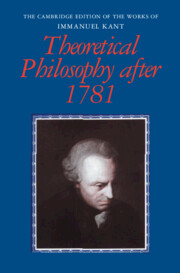Book contents
- Frontmatter
- Contents
- General editors' preface
- General introduction
- Prolegomena to any future metaphysics that will be able to come forward as science (1783)
- Metaphysical foundations of natural science (1786)
- On a discovery whereby any new critique of pure reason is to be made superfluous by an older one (1790)
- What real progress has metaphysics made in Germany since the time of Leibniz and Wolff? (1793/1804)
- On a recently prominent tone of superiority in philosophy (1796)
- Settlement of a mathematical dispute founded on misunderstanding (1796)
- Proclamation of the imminent conclusion of a treaty of perpetual peace in philosophy (1796)
- Editorial notes
- Glossary
- Index of names
- Index of subjects
On a discovery whereby any new critique of pure reason is to be made superfluous by an older one (1790)
Published online by Cambridge University Press: 29 July 2009
- Frontmatter
- Contents
- General editors' preface
- General introduction
- Prolegomena to any future metaphysics that will be able to come forward as science (1783)
- Metaphysical foundations of natural science (1786)
- On a discovery whereby any new critique of pure reason is to be made superfluous by an older one (1790)
- What real progress has metaphysics made in Germany since the time of Leibniz and Wolff? (1793/1804)
- On a recently prominent tone of superiority in philosophy (1796)
- Settlement of a mathematical dispute founded on misunderstanding (1796)
- Proclamation of the imminent conclusion of a treaty of perpetual peace in philosophy (1796)
- Editorial notes
- Glossary
- Index of names
- Index of subjects
Summary
Kant's short treatise, Über eine Entdeckung, nach der alle neue Kritik der reinen Vernunft durch eine ältere entbehrlich gemacht werden soll (On a Discovery whereby Any New Critique of Pure Reason Is to Be Made Superfluous by an Older One, henceforth to be referred to as On a Discovery) appeared in April, 1790, simultaneously with the Critique of Judgment, to which it alludes in its closing pages. It is a polemical piece, containing Kant's response to the critique of his philosophy launched by the Wolffian philosopher and professor at Halle, Johann August Eberhard (1739–1809).
Eberhard's opposition to Kant's philosophy dates back to the first appearance of the Critique of Pure Reason (1781), and he continually criticized it in his lectures. With the publication of the second edition in 1787, however, he evidently felt the need to make his opposition known to a wider public. Thus, together with other Wolffians, most notably J. G. Mass and J. E. Schwab, he founded in 1788 a journal, the Philosophisches Magazin, the general purpose of which was to provide an organ for a full-scale attack on the Kantian philosophy from the standpoint of the rationalism of Leibniz and Wolff. More specifically, its intent was to counter the Allgemeine Literatur-Zeitung, a journal which had been founded in Jena in 1785 by Kant's friend and ally J. G. Schultz for the purpose of defending and promulgating the critical philosophy.
- Type
- Chapter
- Information
- Theoretical Philosophy after 1781 , pp. 271 - 336Publisher: Cambridge University PressPrint publication year: 2002
- 5
- Cited by



